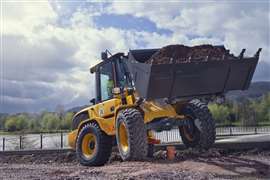Green ambition: The drive towards environmentally-friendly excavators
25 November 2009

Excavator manufacturers are investigating technologies to improve environmental performance. Becca Wilkins reports on current and future ‘green' strategies.
The latest excavators boast improved productivity and fuel efficiency and offer reduced levels of fuel consumption. While these factors and others combine to reduce total machine operating costs - important during the current economic climate - they also mean the excavator is more environmentally friendly.
Speaking for Case, Dave Garner said as environmental awareness increases inside and outside of the construction industry ‘green' issues have become more of a priority for excavator manufacturers too.
He said, "On our CXB range of excavators we have looked at reducing fuel consumption as well as pollution and also oil changes and greasing intervals - all of which are using up resources."
Fuel focus
Helping to push the issue of the environment to the top of manufacturers' agendas are the engine emissions regulations - the next level of which come into force in 2011.
Mr Garner added the issues of fuel efficiency and fuel consumption effectively go "hand-in-hand" and are driven in many respects by the engine emissions regulations.
"We have to make the engine more and more efficient for those regulations so theoretically fuel consumption should also be reduced. It's proved to be the case with the CXB excavator range," he said.
He added compared to the previous models fuel consumption has been reduced by around -20% pro rata with -10% through the engine and -10% via the excavator's hydraulic system.
Meanwhile, Volvo's Mike Rhoda said fuel efficiency is the current key industry driver.
"We're looking at a wide range of fuel efficiency improvement technologies and they include several unique electro-hydraulic system advances that improve power management and power generation - things like actuator efficiencies.
"At the end of the day the excavator is basically a portable high-density, electro-hydraulic actuated power plant for work processes so there are significant gains to be made by reducing leakages and wasted energy during idle times or low load periods," he stated.
Mr Rhoda told CE in terms of overall fuel efficiency the base engine performance is also key and Volvo's engine department continues to pursue improvements in this area. He said Volvo has been looking at three electro-hydraulic projects for more than a year and will be focused on them until the company finds a way to achieve the gains it has identified out of the system losses.
Emissions
Most manufacturers face some challenges in meeting the deadline for integrating the Stage IIIB engines into the machines.
Mr Rhoda said, "At a machine design level the primary challenge for Stage IV or Stage IIIB is to ensure that the new engines and the exhaust gas treatment systems are reliable and then to somehow fit them into the compact footprint of the machine layout. Many construction equipment manufacturers are moving towards the diesel particulate filters and regeneration systems so that's a real space challenge as well as reliability challenge because that technology is new to off-highway use."
He added at the same time manufacturers must not sacrifice machine maintenance and service levels.
"So there's a design challenge and then there is also what I think of as a customer value proposition to consider because clearly these additional parts and systems are going to bring additional costs, so when we go out with the Stage IV offering we want to ensure the customers are getting better machine performance along with this regulatory compliance. "
Elsewhere, Mr Garner said the CXB range of excavators, which are manufactured in Japan as a joint venture between Case and Sumitomo, use Isuzu engines which are already Stage IV ready.
"For Stage IIIA we bit the bullet and went for exhaust gas recirculation (EGR) which is "the big one" to my mind, so to meet the next level as far as we're concerned we will be integrating the diesel particulate filter (DPF). The engine is already designed to accept that filter, so we can modify the engine quite easily to suit the regulations," he explained.
He added all other products from the company use Case engines via the Fiat Group's Powertrain division - where Stage IV technology already exists in the Group's Iveco on-highway vehicles.
Meanwhile, Mr Rhoda told CE the company had to proceed with developing the next stage of engine emission compliant machines despite it being an expensive activity during the economic crisis.
However, he said, "Through the crisis so far Volvo CE has allocated a historically high percentage of revenues towards product development. We are running at a higher rate than we have in the past - obviously the total pool is smaller when you're talking about the percentage of revenues, so clearly resources are limited and we've had to establish priorities to reflect that."
Hybrid
The quest to produce more environmentally-friendly machines has inevitably led manufacturers to look at developing hybrid machines. At Intermat earlier this year Case revealed its prototype hybrid materials handling excavator which the company claims has the potential to reduce fuel consumption by up to +40%, with a substantial cut in exhaust gas emissions.
A spokesman for Case said key elements of the prototype hybrid include an electric generator, an electric swing motor and a magnet. He added the machine retains a diesel engine to power the hydraulic system for the boom and track drive, but this motor also drives the electric generator, which in turn is used to power the lifting magnet and the electric slew motor.
When the engine is under low load conditions, surplus energy is converted to electricity and stored in high efficiency capacitors. As the engine comes under higher load the electrical system provides power support, allowing for constant engine speed hence reducing fuel consumption and noise levels.
"By reducing fuel consumption there is an immediate reduction in gaseous exhaust emissions, resulting in a lower environmental impact and a significant cut in operating costs for the customer," the spokesman said.
Volvo too is actively pursuing hybrid technologies according to Mr Rhoda.
He added the company is trying to leverage the work that's been accomplished not only in other parts of Volvo Construction Equipment but other parts of the Volvo Group but said it was difficult to say how big a part hybrid technology will play in the future development of excavators.
"The reason for that is with today's hybrid technologies in terms of the parts and systems developed for power transmission and energy storage - especially in regeneration - construction equipment customers may perceive the potential for those fuel efficiency gains to be partially off-set by higher hardware costs and perhaps unknown reliability in the tough environment of mining and construction sites.
"So this perception of balance I think will change as the progress is made on the technology but it's hard to judge the timeline."
He stated that Volvo is aggressively pursuing hybrid technologies but remains prudently realistic in regards the speed of industry acceptance.
"I think construction equipment operators, customers and owners will closely screen any new technology primarily for the reliability aspect and whereas hybrid technologies have been and are being proven more so each day in automotive applications, there is yet to be that reliability proven on construction equipment applications. So I think we need to be prepared for that cautiousness on the part of customers," Mr Rhoda said.
Future
Once the final step of the engine emissions regulations has been reached in 2014 the issue of fuel efficiency will remain according to Mr Rhoda.
He said, "I think you'll continue to see a high focus on improving fuel efficiency despite whatever one's opinions are about peak oil or peak gas it's very unlikely that energy costs are going to go down in that timeframe. In terms of operator costs - fuel efficiency - getting more per litre, per gallon, is still going to be important."
Mr Garner said legislation will continue to push environmental concerns as well as efficiency and productivity issues with regards to new product development. He added there will also be an emphasis on operator comfort and safety.
In terms of year on year demand for excavators across Europe Mr Rhoda said Volvo is still seeing a decline, although this has slowed over the past couple of months.
He added it is too early to tell what growth will be like next year from current levels and much too early to make a reliable forecast.






